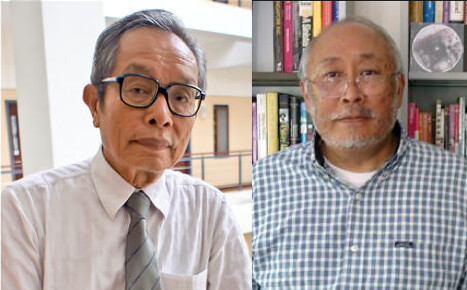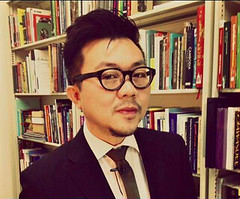
Professor Charnvit Kasetsiri (Left) and Professor Tham Chaloemtiarana (Right)
I have long admired the two respected professors of history and Thai politics, Professor Charnvit Kasetsiri and Professor Thak Chaloemtiarana. While Acharn Charnvit has remained active in his teaching and research at Thammasat University, Acharn Thak has continued to build the good reputation of Thai studies at Cornell University.
A few days ago, Acharn Charnvit wrote an email to Acharn Thak, asking him a number of hard-hitting questions. He hoped that Acharn Thak would enlighten him with honest answers. Acharn Charnvit posed three questions: (1) Is General Prayuth Chan-ocha, Army Chief and the Chairman of the National Council for Peace and Order (NCPO) attempting to be like former despot Field Marshal Sarit Thanarat (1958-1963)? (2) Whether Acharn Thak thinks that despotic paternalism—also the name of his most well-known textbook—is coming back to Thailand? and (3) What will become of Prayuth? Will he end up like Sarit or Field Marshal Thanom Kittikachorn (1963-1973)?
Here is the Acharn Thak full answer to Acharn Charnvit questions (with minor editing for clarity only):
The spectre of Sarit will always haunt Thai politics. The elite and business class still want a strong and stable government; and they see a strong military leader as being able to provide that. Did you see the YouTube lecture that Narongchai Akrasanee, and other like-minded personalities, gave at Chula (Chulalongkorn University)? They had blinders on and focused only on economic gains, but not on economic redistribution of income. They also “pooh poohed” (expressed contempt for) the suspension of civil liberties.
Although General Prayuth and others before him have wanted to use Sarit tactics, the outcome will be different. Sarit did not have many who could mount any credible opposition to his dictatorship; I do not mean militarily or physically. The mental composition of the Thai people has changed and there is more mental opposition to dictatorship today that will oppose any long-term dictatorship. Prayuth is acting like any military leader by using orders and intimidation against those who do not see eye to eye with him. But unlike Sarit, I do not think that the public or the international community will stand for a Sarit-style public execution of state’s enemies or arrest of intellectuals opposed to his regime.
Sarit also controlled the media, which is no longer possible in this age. Sarit had a good “excuse” for his dictatorship—the need to control the spread of Communism with a promise to give Thailand’s prosperity through “Phattana”. Prayut is trying to control the spread of a new political culture (egalitarianism), which is not just internal to Thailand but also international in nature. What he promises is “happiness”, which is not definable.
Narongchai said that, under Prime Minister Yingluck Shinawatra (2011-2014), the Thai economy had suffered. But he ignored the fact that, even with corruption, Prime Minister Thaksin Shinawatra (2001-2006) was successful economically (noted that Sarit was also corrupt and successful).
The new constitution gives the King wide authority. But as we all know, his health is not good and what would happen if the new king would not do what the junta wants. I do not think that Prayuth can bring back despotic paternalism, at least not in the long run. At best, he may reverse the clock of political development through the forming of a Prem-like regime (Prem Tinsulanonda—prime minister from 1980-1988 and currently the president of the Privy Council) where the army acts as a threatening power. At least, Sarit could claim that he was both a Bangkokian and a son of Isan, which made it hard for politicians from that region to oppose him. Sarit intimidated and murdered enemies of the state who were hapless “Communists”, “Chinese arsonists”, and harmless “phi bun”. Prayuth has to deal with large swaths of Thais who have been used to open and messy politics for decades and who have their own ideas of what happiness means. No society can prevent disagreements within (look at the United States today), nor is economic prosperity a panacea for happiness.
I think that Prayuth will face the same problems as your classmate from Suan Kulab School (General Surayud Chulanont, former Prime Minister from 2006-2008). The Thai genie has been let out of the bottle and it would be hard to get it back inside. Sarit dealt with an expanding middle class but a docile rural and lower class. Nowadays, the lower class has grown richer, educated, and demanding their just share of power and wealth. Thaksin is just the harbinger of the future. It just takes someone to organize the disgruntled sectors of Thai society (much larger than those who support the junta) to instigate change. (END of Acharn Thak’s answer here.)
Acharn Thak’s views on the current political situation and the future path of Thailand with Prayuth as a guiding light seem pessimistic; yet, it is not without hope. It is true that the Thai political landscape has tremendously changed in the past decade. The domination of power in the hands of the elite—those days under Sarit—is today coming loose at the seams. One factor, which Acharn Thak may have failed to mention, is that the rise of social media and the major role it plays both in terms of consolidating and undermining democracy at the same time.
According to Acharn Thak, the despotic paternalism à la Sarit may not return. However, Thailand is approaching an uncertain royal transition. Enemies of democracy will try every possible way to take control of such transition in order to preserve their own power interests. In the process, more democratic institutions will be weakened, human rights violated. Will the Thais be able to find a new political consensus, which could bring the end of the protracted political deadlock?

Pavin Chachavalpongpun is associate professor at Kyoto University’s Center for Southeast Asian Studies.

